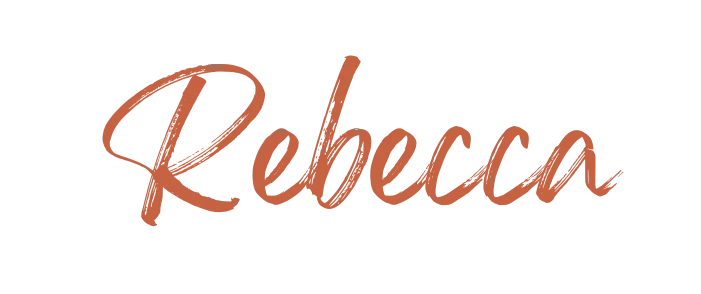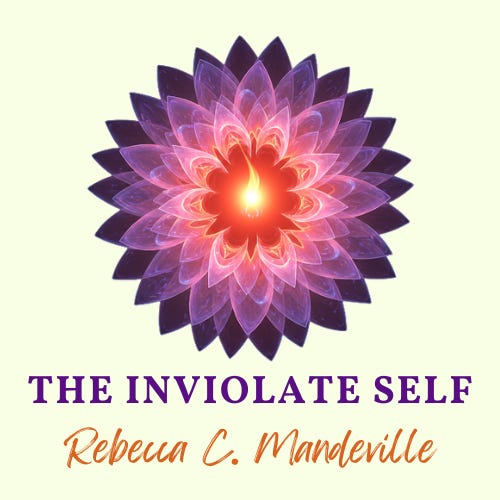Introducing 'The Inviolate Self'
Reflections on healing from Childhood Neglect, Abuse, and the Effects of Trauma
Welcome! This is The Inviolate Self, the personal Substack of Rebecca C. Mandeville, founder of Family Scapegoating Abuse (FSA) Education and the author of Rejected, Shamed, and Blamed: Help and Hope for Adults in the Family Scapegoat Role.
Check out my other Substack, where I have free and paid content and a private community for FSA adult survivors: Healing the Scapegoat Wound: FSA Education Support Community.
A reminder that all of my posts on The Inviolate Self are public. Any comments you leave on my posts are therefore also public.
Thank you for subscribing to my new Substack, The Inviolate Self. I’m grateful to have you here and feel privileged to be able to share my personal reflections on abuse, trauma, and recovery with you.
But before I begin sending out posts, I’d like to first share my definition of The Inviolate Self - and why, for me, accessing this inner presence, or space, has been a key part of my healing from childhood neglect, abuse in various forms, and trauma. This has also been true for many of the adult survivors I work with in my private psychotherapy practice as well.
About the Inviolate Self
In the heart of our being resides a sanctuary untouched by the storms of life, a flame that burns steadily despite the winds of adversity. This is the inviolate self.
The inviolate self is not the surface personality, tossed about by emotions and external pressures. It lies deeper, a silent witness and guide, evolving through our experiences yet remaining eternally pure and whole.
Think of it as the innermost chamber of your being, a space where authenticity dwells. It is the source of our deepest longings for truth, beauty, and goodness. When we act from this center, we experience an unshakeable sense of rightness and peace, even amidst outer turmoil.
The journey of healing, especially after abuse, provides us with a clear impetus to connect deeply with this inviolate self. The wounds inflicted by others can create layers of fear, doubt, and self-rejection, obscuring the radiant core within. Yet, that core remains, patiently waiting to be rediscovered.
Tuning Into Our Source
By turning inward through practices like mindful awareness and sincere self-reflection, we can begin to peel back these layers. We can learn to distinguish the voice of the wounded ego from the gentle whisper of the inviolate self. And as we do, we tap into a wellspring of resilience, an inherent strength that no external force can truly diminish.
The inviolate self reminds us of our inherent worthiness, our intrinsic connection to something larger, greater, more expansive - a profound, timeless reality that exists beyond our current egoic fears and struggles. It has been, for me, the unwavering foundation upon which true and lasting healing can be built.
It is the truth of who we are, untouched and forever whole. Constant.
You might think of the inviolate self in different terms, based on your religious or spiritual orientation. For some, the inviolate self might be reflected in nature. Some might think of it as ‘The Tao’. To others, it is something ineffable that is both immanent and transcendent, existing both within and outside of oneself. And yet, despite these differences, the felt-sense experience of being connected to something greater than the egoic consciousness may be similar.
What does ‘the inviolate self’ mean to you?
I’d love to hear from you in the comments. Please do remember that this post is public, so your comments are public as well.
Copyright 2025 | Rebecca C. Mandeville | All Rights Reserved









Thank you Rebecca, beautiful ! For me the inviolate self is reflected in nature, be it a new born lamb, the fresh new leaves on trees, spring flowers, a beautiful sunset or sunrise, a time to pause & think & experience the joy of our surroundings.
Dear Rebecca,
I welcome your new publication with great enthusiasm.
There is still a significant stigma in society when it comes to acknowledging childhood abuse, especially when it is verbal and stems from a narcissistic family environment. There is also a very limited understanding of what trauma truly means.
It is staggering how often the term is dismissed across various circles. I have heard many times the remark, "Oh well, we all go through trauma in our lives." It never fails to surprise me — and a part of me always wants to say, "Mate, you have no idea what you’re talking about."
I cover these topics on my blog as well, and it is a pleasure to meet someone who is ready to share personal storytelling, helping others through such openness and courage. For me sharing is a form of therapy.